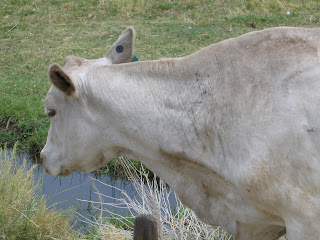Donny hit Send just as the WiFi shut down as the sun dropped and the farm's solar panels stopped working. The Ωmail service some former Googlers had built with the wreckage of Gmail after Google folded wasn't free, but it was the best way to keep in touch with his wife back in the city. He, Fred, and 4 other guys had come here in Fred's Prius because Fred had learned there was a farmer with WiFi in the dorms who hired city workers, albeit not for the same pay as the more experienced latino workers. The immigrant latinos weren't coming up nearly as much since the economic collapse in the U.S. They had been able to carry enough gas in the Prius to get to the farm, but weren't as sure about finding gas on the way home over the deteriorating roads at the end of the season. Donny locked up his iPad in his locker and got into bed. He thought for a few minutes about the uselessness of his Ph.D. in Economics, but the hard work tilling, planting, and pulling weeds was better than the sporadic dole in the city. The farmer paid his wages directly into PayPal, which had managed to stay in business and take over some of the functions that the failed banks once performed. The handful of remaining banks only troubled themselves for what passed for wealthy in America's shrinking economy. The farmer numbered amongst those wealthy few. He had bought up several of his failed neighbors and had enough cash to pay for human workers, since machines were now too expensive to run. Donny thought wistfully about his wife and kids, and of the oil-rich world of his youth, when life was easy and people weren't starving back in the city, but exhaustion quickly put him to sleep.
Thursday, May 6, 2010
Saturday, May 1, 2010
Where's Your Beef Been?
Recently, the Population Reference Bureau and the International Food Policy Research Institute hosted their first "Malthus Lecture". A distinguished researcher we know spoke on Meat. How's that for a title? This follows on the heels of a special issue of Science Magazine devoted to Food Security. I subscribe to Science and I looked at outline of the lecture as well as the web sites of the food organizations. With the world's oil production on the verge of a 4-5% annual decline, one would think there would be some discussion of effects on food supplies and human populations, but there's not. Why is this?
Let's lead into this with my experiences with the iconic meat animal, the cow. I go way back with cows.
Cattle ranching is a ubiquitous feature of the American Southwest. All my field work as an undergraduate and a doctoral student was on range I shared with cows. We're within running distance of a large ranch where we routinely hang out with cows, and my wife has photographed the round-up. She's helped with a round-up on horse-back on another ranch. This shy girl was photographed in the arid Owens Valley in California on my way to the Death Ride.
Let's lead into this with my experiences with the iconic meat animal, the cow. I go way back with cows.
Cattle ranching is a ubiquitous feature of the American Southwest. All my field work as an undergraduate and a doctoral student was on range I shared with cows. We're within running distance of a large ranch where we routinely hang out with cows, and my wife has photographed the round-up. She's helped with a round-up on horse-back on another ranch. This shy girl was photographed in the arid Owens Valley in California on my way to the Death Ride.
Subscribe to:
Comments (Atom)
